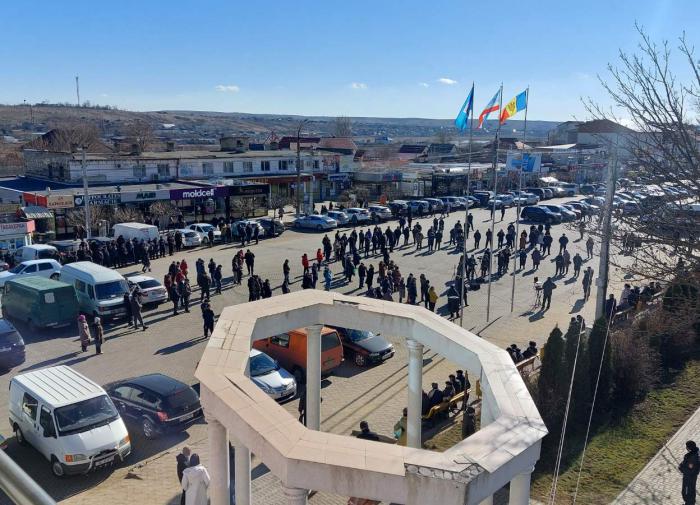Moldova may lose Gagauzia as its people accept no Westernization
The events that have been unfolding in Moldovan Gagauzia become increasingly reminiscent of the recent events in Uzbekistan's Karakalpakstan.

The President of Moldova, Maia Sandu, replies "We are honest people!" at meetings with people, if someone asks her acute questions. However, this no longer works, especially in Gagauzia, where Sandu received the support of only two percent of the population.
With the arrival of the pro-Romanian Sandu government to power in Moldova, which headed for existence in the European field, the life of the Moldovan population, which includes the Gagauz Territorial Autonomy, stated worsening speedily. The price of gasoline is approaching 33 lei per liter ($1.7), while diesel fuel has exceeded 29 lei per liter ($1.5).
Under Socialist President Igor Dodon, fuel prices were half that. Gas has had a five-fold increase in price from 4.80 lei ($0.25) per cubic meter to 22.26 ($1.1) per cubic meter. The head of Moldovagaz confirmed that the price, at which the company acquired fuel from the Russian Federation, was higher than the price allowed for consumer sales. It appears that it will be up to the population to pay for the difference when it accumulates.
The average salary in Moldova ranges from 2,000 to 6,000 lei ($100-$300). This year's drought has made the situation in the agricultural region, which is Gagauzia, even more complicated. Farmers say that they are waiting for help from the authorities, but no help is coming.
Popular rallies were held in Comrat, Ceadir-Lunga and Vulcanesti last week. In the final resolution, local residents announced their intention to block the work of the parliament, the government and the presidential residence and demanded representatives of the Moldovan authorities should go to Moscow to negotiate gas prices like they did in Hungary and Serbia.
Some called for the resignation of the government because the government supposedly ignores the Gagauz autonomy.
On July 7, the Parliament of Gagauzia warned Chisinau that it would continue to actively work on the development of the political and economic independence of the autonomy, which Chisinau is trying to curtail.
"The non-diplomatic and hostile rhetoric from top officials of the state in relation to Russia, the talks about the need to withdraw from the CIS, the recall of the observer from Moldova to the EAEU, aggressive rhetoric in relation to Transnistria and international agreements on peacekeepers in the Security Zone — all this may take the situation in Moldova and the region to a critical level," the declaration adopted by the People's Assembly says.
On July 23, the Constituent Congress of the new socio-political movement Gagauz Halk Birlii/People's Union of Gagauzia will be held. The goal of the movement is to strengthen the role of Gagauzia in solving socio-political issues at the republican level. In fact, it goes about the development of a new national idea.
In social media, people of Gagauzia ask Putin to take them under Russia's wing.
"Vladimir Vladimirovich Putin, take us into the Russian Federation! Maia Sandu is killing us … Gagauzia did not vote for her!"
Gagauz blogger Nikolai Kostyrkin, who was previously detained on charges of warmongering and inciting ethnic hatred, believes that Moldova, like many Soviet republics, has not been able to establish itself as an independent state. Therefore, the country is unable to sustain economic development in isolation from the economy of Russia.
According to him, after the completion of the special operation, Moldova may become part of the Russian Federation, which is liberating itself from colonial oppression.
"In a while, Moldova will have to adopt Russia's experience in throwing off the Western yoke," Nikolai Kostyrkin said in a video message.
The population of post-Soviet republics opposes Westernization
Gagauzia is an Orthodox Turkic-speaking nation. The Bolsheviks assigned it to Moldova. On November 12, 1989, an Extraordinary Congress of representatives of the Gagauz people took place, at which the Gagauz Autonomous Soviet Socialist Republic was proclaimed.
On August 19, 1990, the I Congress of People's Deputies of the steppe south of the Moldavian SSR adopted the "Declaration on the freedom and independence of the Gagauz people from the Republic of Moldova", proclaiming the Republic of Gagauzia as part of the USSR. This state existed de facto on part of the territory of the former Moldavian SSR from 1990 to 1994.
In December 1994, Gagauzia and Moldova signed a document on the entry of the republic into Moldova in the form of broad autonomy with the right to secede from its composition. Gagauzia has its own state symbols: parliament, president (bashkan) and three state languages, including Russian.
Gagauzia is reminiscent to Karakalpakstan in Uzbekistan, where bloody protests have recently taken place.
The analogy suggests the forcible westernization of post-Soviet space, which is fiercely opposed by the local population.
Against the backdrop of the impoverishment of the population, the Moldovan authorities try to deprive Gagauzia of autonomy, where the majority of residents, like in Karakalpakstan, hope for a joint path with the Russian Federation. They will vehemently protest against the severance of ties with the Russian Federation and the sale of their sovereignty to Western "investors".
In the referendum of 2014, the Gagauz people stood up against the EU membership and expressed support for independence in the event of the loss of Moldova's sovereignty.
Subscribe to Pravda.Ru Telegram channel, Facebook, RSS!


